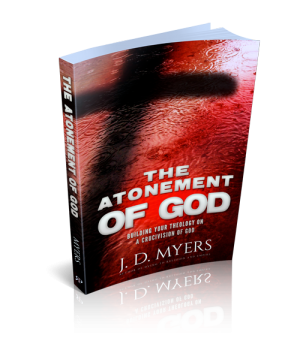
The Atonement of God; Building Your Theology on a Crucivision of God is the latest book I have read. Written by J.D. Myers, it is about a new way to view the crucifixion of Christ, which Myers argues is actually a very old way to view things.
Starting out by arguing why the Penal Substitution theory is incomplete, Myers presents to us the Nonviolent view of atonement. For the sake of space here, I will drastically over simplify things this way; the nonviolent view of atonement says that God did not will Jesus to the cross, but we humans did. God then used the sacrifice to defeat sin and death, but apparently this was not necessary for forgiveness, since God had already given us that.
The theory is needed, of course, to help us make sense of a God who is love but also demands justice. At least, this is what J.D. Myers argues. The book is set up with alternative views of the atonement, with some discussions, some very important discussions, left out, ostensibly for other books to be written at later times.
Some of his arguments seem to be summed up as 'I like this theory over that interpretation, so it must be correct.'
In discussing the wrath of God, a problematic notion to the nonviolent view of the atonement, he theorizes Paul using a technique of writing that uses a second voice in the writing for Paul to argue against. While Paul does indeed use this technique in some very obvious ways; for instance, when he says things like, 'some could say' or 'it has been said', J.D. Myers seems to lump any difficult verse into the mouth of the fictional person Paul is arguing against.
It is a dangerous game, especially when discussing foundational truths in scripture, to argue that all the difficult verses for us to understand are simply straw men to be knocked down.
I would have preferred, in a book discussing scripture, to see more verses printed out and parsed, than to simply have verses listed as backing up the authors theories.
Much liberty is taken in coming up with what certain Biblical stories meant and what verses actually mean. When all of those liberties grate against traditional views of the Bible, as well as a plain reading of scripture, I start to grow very concerned about what I am reading. This, of course, is not a bad thing in itself, as we should always be thoughtful Christians, knowing what we believe and why we believe it.
This book does get one very big truth correct. What we believe will impact how we live.
I was given this book by my friends at SpeakEasy. They give me books and ask that I review. If you like to see more information about this book, check out the links below.
Book site: RedeemingGod.com
Reviews and Excerpts from The Atonement of God
The Atonement of God on Facebook
Jeremy Myers on Twitter
The Atonement of God on Amazon: http://amzn.to/1ThcG43
Reviews and Excerpts from The Atonement of God
The Atonement of God on Facebook
Jeremy Myers on Twitter
The Atonement of God on Amazon: http://amzn.to/1ThcG43
#SpeakeasyTheAtonementofGod
Comments